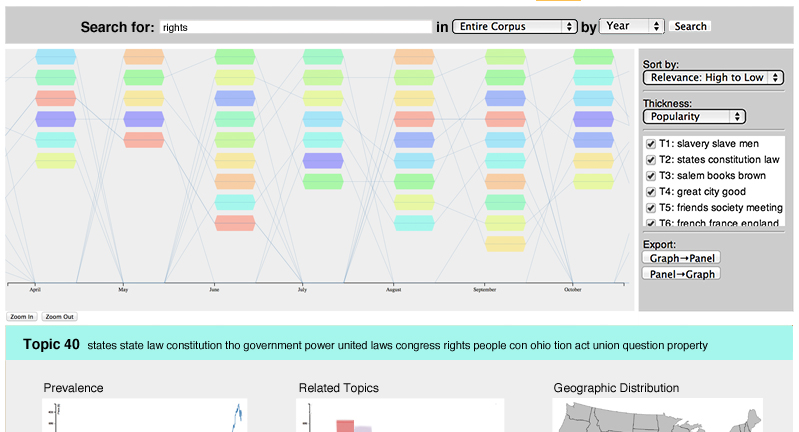The Office of Digital Humanities Workshop on October 29th and 30th in the Technology Square Research Building didn’t have many formal talks. However, Dr. Lauren Klein gave a presentation on Tome, a tool that she is developing, in collaboration with Jacob Eisenstein in Interactive Computing (with the assistance of current and former Computational Media and Digital Media students), to facilitate the interactive exploration and visualization of a set of nineteenth-century anti-slavery newspapers. She was kind enough to answer a couple of questions for me.
Why do you consider the subject of your presentation important?
There’s no question that large-scale digitization projects like Google Books have dramatically increased the amount of material available for scholarly research, but there’s no way that a single person, or even a group of people, could ever hope to read it all. Our goal is to develop a tool that will allow scholars to begin to make sense of this material. More specifically, we’re working on new interactive visualization techniques that will allow humanities scholars to trace the evolution and circulation of the themes that are important to them across social networks and over time.
What sort of an impact on the field of digital humanities are you working to make?
Visualizations are powerful because they reflect existing assumptions about knowledge production as much as they facilitate new modes of inquiry. By identifying our own disciplinary assumptions— mine from literary and cultural studies, and Prof. Eisenstein’s from computational linguistics—and by being explicit about the design decisions we’ve made over the course of the project, we hope, firstly, to increase the field’s understanding of how visualizations work and what they can do. But we also want to use the project to model a new mode of interdisciplinary collaboration, one that brings the methodological emphasis of the digital humanities to bear on humanities scholarship and computer science alike.
Dr. Klein added that at the Digital Humanities Workshop there was “a terrific turnout, with the TSRB auditorium filled to capacity. One of the primary goals of the workshop was to facilitate new collaborations across regional institutions, and it seems like that process has already begun.”


